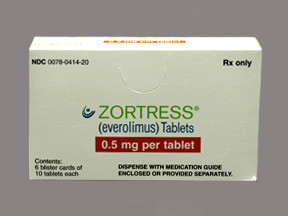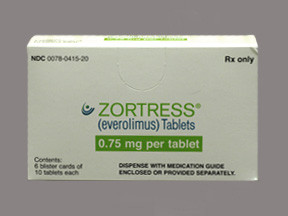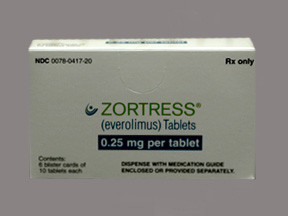EVEROLIMUS (TRANSPLANT) - ORAL
PHONETIC PRONUNCIATION: (/E-ver-OH-li-mus)
COMMON BRAND NAME(S): Zortress
GENERIC NAME(S): everolimus
Uses
USES: Everolimus is used with other medications (such as cyclosporine) to prevent rejection of a kidney transplant. Everolimus is also used with other medications (such as tacrolimus) to prevent rejection of a liver transplant. This medication belongs to a class of drugs known as immunosuppressants. It works by weakening your body's defense system (immune system) to help your body accept the new organ as if it were your own.
How to use EVEROLIMUS (TRANSPLANT) - ORAL
HOW TO USE: Read the Medication Guide provided by your pharmacist before you start taking everolimus and each time you get a refill. If you have any questions, ask your doctor or pharmacist. Take this medication by mouth as directed by your doctor, usually every 12 hours with your cyclosporine dose, beginning immediately after a kidney transplant. Everolimus is usually started 30 days after a liver transplant and is usually taken every 12 hours with your tacrolimus dose. You may take this medication with or without food, but it is important to choose one way and take this medication the same way with every dose. Swallow this medication whole with a glass of water. Do not crush, chew, or break the tablets. The dosage is based on your medical condition, response to treatment, laboratory tests, and other medications you may be taking. Be sure to tell your doctor and pharmacist about all the products you use (including prescription drugs, nonprescription drugs, and herbal products). Use this medication regularly to get the most benefit from it. To help you remember, take it at the same times each day. Do not increase your dose or use this medication more often or for longer than prescribed. Your condition will not improve any faster, and your risk of side effects will increase. Avoid eating grapefruit or drinking grapefruit juice while using this medication unless your doctor or pharmacist says you may do so safely. Grapefruit can increase the chance of side effects with this medicine. Ask your doctor or pharmacist for more details. Since this drug can be absorbed through the skin and lungs and may harm an unborn baby, women who are pregnant or who may become pregnant should not handle this medication or breathe the dust from the tablets.
Side Effects
Precautions
Interactions
Overdose
Images
Reviews
Faq for EVEROLIMUS (TRANSPLANT) - ORAL
Everolimus is prescribed to prevent rejection of organ transplants, such as kidney or liver transplants.
Everolimus belongs to a group of medications called immunosuppressants. It works by suppressing the immune system's ability to reject the transplanted organ, allowing the body to accept and adapt to the new organ.
Common side effects of Everolimus may include mouth ulcers, diarrhea, nausea, vomiting, fatigue, headache, and joint pain.
Everolimus is usually taken orally once a day, at the same time each day. It is important to take it exactly as prescribed by your doctor, and do not stop taking it without their guidance.
It is generally recommended to avoid alcohol while taking Everolimus, as mixing the two may increase the risk of liver damage.
Everolimus may harm an unborn baby, so it is important to discuss the potential risks and benefits with your doctor if you are pregnant or planning to become pregnant. It is also not recommended to breastfeed while taking Everolimus, as it may pass into breast milk.
If you miss a dose, take it as soon as you remember. However, if it is close to the time for your next dose, skip the missed dose and continue with your regular dosing schedule. Do not take a double dose to make up for a missed one.
Certain medications, particularly strong inducers or inhibitors of certain enzymes, may interact with Everolimus and affect its effectiveness or increase the risk of side effects. It is important to inform your doctor and pharmacist about all the medications and supplements you are taking.
The duration of Everolimus treatment may vary depending on individual circumstances and the specific transplant. Your doctor will determine the appropriate length of treatment for you.
Warning
WARNING: Everolimus can increase your risk for developing certain types of cancers (including skin cancer, lymphoma). Tell your doctor right away if you notice unusual skin changes, change in the appearance/size of moles, unusual growths/lumps, swollen glands, night sweats, or loss of appetite/weight loss. This medication lowers your ability to fight infections. This may make you more likely to get a serious (rarely fatal) infection or make any infection you have worse. Tell your doctor right away if you have any signs of infection (such as fever, chills, persistent sore throat, cough). Using this medication may increase your risk for developing a blood clot in your kidney transplant, usually within the first 30 days after surgery. Tell your doctor right away if you have nausea/vomiting, pain in your groin/lower back/abdomen, blood in your urine, or unusual decrease in the amount of urine. This medication may increase the risk of death from infection in people who have had a heart transplant. Before using this medication, tell your doctor if you have had a heart transplant.
Disclaimer
IMPORTANT: HOW TO USE THIS INFORMATION: This is a summary and does NOT have all possible information about this product. This information does not assure that this product is safe, effective, or appropriate for you. This information is not individual medical advice and does not substitute for the advice of your health care professional. Always ask your health care professional for complete information about this product and your specific health needs.




No Reviews Yet